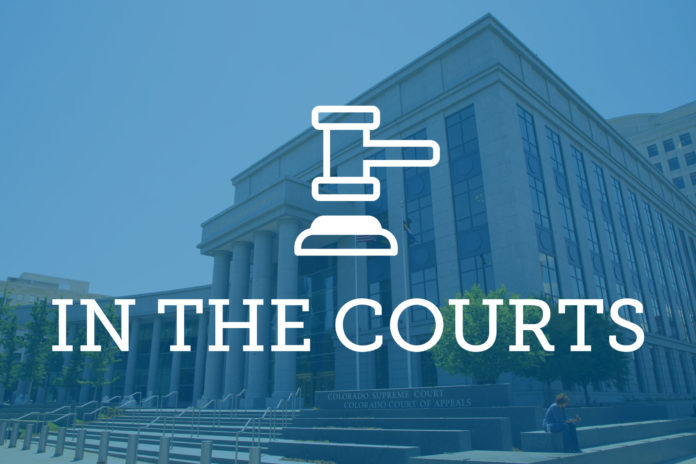

Editor’s Note: Law Week Colorado edits court opinion summaries for style and, when necessary, length.
Gilberto Andres Montoya appealed his convictions of first-degree trespass, criminal mischief and failure to leave the premises. He challenged these convictions on four grounds: the trial court reversibly erred by denying his motion to disqualify the prosecutor and the entire district attorney’s office, denying his right to a public trial by requiring the public to view the proceedings via livestream, denying his motion for judgment of acquittal and finding sufficient evidence supported his conviction for failure to leave the premises and failing to make any findings concerning two jurors who weren’t paying attention to the evidence during trial.
According to the opinion, Montoya’s sufficiency argument raised a novel issue of statutory interpretation concerning Section 18-9-119(2) of the Colorado Revised Statutes. The Colorado Court of Appeals concluded the statute’s plain language sets forth two means of committing the offense of failure to leave the premises and sufficient evidence supports Montoya’s conviction under the barricading clause.
But the court also concluded Montoya was deprived of his constitutional right to a public trial and remanding for further findings under U.S. Supreme Court Case Waller v. Georgia would be futile. The appeals court reversed the judgment and remanded for a new trial.
William Burdette appealed the use of two previous driving while ability impaired cases to elevate his 2019 driving under the influence conviction to a felony. According to the opinion, Burdette relied on an 86-year-old U.S. Supreme Court Opinion, Johnson v. Zerbst, that said compliance with the Sixth Amendment’s right to counsel is an “essential jurisdictional prerequisite.”
Burdette argued that because he was erroneously denied his constitutional right to counsel in two DWAI cases in the 1990s, the courts in those cases lacked subject matter jurisdiction and the resulting convictions couldn’t be used to elevate his new DUI conviction to a felony.
According to the opinion, Zerbst is in tension with later decisions from the Supreme Court and Colorado courts narrowing the definition of “jurisdiction,” including subject matter jurisdiction. The opinion noted no published Colorado appellate decision had resolved this tension or otherwise clarified how or whether Zerbst impacts a trial court’s subject matter jurisdiction.
The appeals court reconciled these decisions and held the denial of a defendant’s Sixth Amendment right to counsel doesn’t strip the court of subject matter jurisdiction. The appeals court affirmed the judgment.
According to the opinion, the case presented numerous issues arising out of disputes between the three members of an amalgamation of limited liability companies operating in the cannabis industry under the name Native Roots.
Based on an arbitration clause in Native Root’s operating agreement, the members arbitrated their disputes, which resulted in a $100 million award and a permanent injunction in favor of two of the members, Josh Ginsberg and Rhett Jordan, and against Brightstar LLC and its sole member, Peter Knobel.
Ginsberg and Jordan filed motions in the district court to confirm the arbitration award and Brightstar and Knobel filed motions to vacate it.
In an omnibus order, the district court denied the motions to confirm and granted the motions to vacate. It concluded, among other things, that Brightstar’s and Knobel’s motions to vacate were timely, the arbitrator was biased against Brightstar and Knobel and Knobel wasn’t subject to arbitral jurisdiction. Both sides appealed different aspects of the omnibus order to the Colorado Court of Appeals.
The appeals court addressed the issue of first impression concerning the interpretation of Colorado Rule of Civil Procedure 5 and concluded the service of a pleading or other paper by email to a party’s attorney is effective if the attorney has included an email address in previous court filings.
The appeals court also concluded Brightstar’s and Knobel’s motions to vacate were timely. Based on that conclusion and the appeal court’s disposition on the other issues raised on appeal, it affirmed the judgment in part, reversed it in part and remanded the case with directions.
Wenzell v. USAA and State Farm
Anthony Wenzell appealed the trial court’s grant of summary judgment in favor of defendants USAA and State Farm.
State Farm and USAA moved for summary judgment on the grounds Wenzell had failed to cooperate, arguing noncooperation constituted a failure to comply with a condition precedent rather than an affirmative defense.
The Colorado Court of Appeals concluded that because neither company could assert that Wenzell failed to cooperate, the trial court erred when it granted both companies summary judgment on these grounds.
The Colorado Court of Appeals reversed the judgment and remanded.

